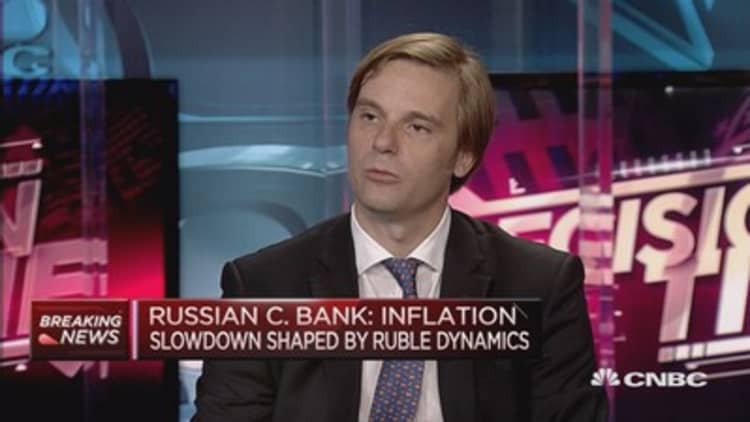Russia's central bank cut interest rates on Friday amid what analysts called more "aggressive" calls for monetary easing.
The central bank cut its key interest rate by 50 basis points to 10 percent on Friday, saying that it made the decision "given the inflation slowdown, in line with the forecast, decrease in inflation expectations and unstable economic activity."
The move was widely expected by economists.
Pressure has grown on the central bank for more monetary easing, but analysts think the central bank will continue its "gradual rate cut strategy" in order to stabilize the rate of inflation to 4 percent by 2017 (it stood at 6.6 percent, as of September).
The central bank itself warned that it was unlikely to cut rates again before the end of the year.
"For the trend towards sustainable decline in inflation to strengthen, according to the Bank of Russia's estimates, the current value of the key rate needs to be maintained till end-2016 with its further possible cuts in 2017 in the first or second quarter."
The bank forecast that annual consumer price growth would stand at 4.5 percent in September 2017 and would then go down to the 4 percent target in late 2017. "When making its key rate decisions in the coming months, the Bank of Russia will assess inflation risks alongside economy and inflation dynamics' consistence with the baseline forecast," it said.
Also, on Friday, S&P Global Ratings upgraded its outlook on the Russia's credit rating to "stable" from "negative."
"External risks to Russia have abated to a significant extent, while the country's economy continues to adjust to the dual shocks of a lower oil price environment and sanctions imposed by the EU and the U.S.," S&P said in a report on the revision.
Capital Economics' Emerging Markets economist Liza Ermolenko responded to the rate cut by saying the central bank appeared "much less dovish than we had expected."
"We still think there's room for significant monetary easing over the next year or so, although the clear risk now is that this will come later and be smaller than we had previously anticipated," she said.
"Today's decision...was correctly anticipated by the vast majority of the analysts but the accompanying statement was surprisingly hawkish. In particular, the Bank explicitly stated that interest rates are likely to remain on hold for the rest of the year (we had expected further 50bp cuts at the remaining two meetings in the year)."
Friday's rate cut is the second time since June that the central bank has tentatively lowered rates. Showing how seriously the central bank is about sticking to its remit to regain price stability in Russia, it last cut rates in August 2015.
Russia's economy has been hit over the last couple of years by economic sanctions for Russia's annexation of Crimea and alleged involvement in a pro-Russian uprising in Ukraine, as well as a drop in the oil price. The ensuing capital flight and drop in the ruble, not to mention its economic isolation, caused Russia's consumer prices to rise dramatically – a year ago, inflation stood around 15 percent.
Russia's central bank was stuck between a rock and a hard place – pressured to stimulate the economy (which it could do by lowering interest rates and encouraging borrowing and spending) but wary of causing inflation to rise.
Despite pressures to cut rates it made reducing inflation its primary concern and its cautious strategy appears to be working with inflation in gradual decline and getting closer to the central bank's target.
The shadow of popular discontent

Eurasia Group's Russia analysts Jason Bush, Zacharyu Witlin and Alexander Kliment said in a note Thursday that "while industrial lobbies want lower interest rates, most ordinary Russians care more about bread-and-butter issues such as the price of bread and butter."
They noted that according to one recent poll by the Levada Center, an independent polling agency, the government's failure to address rising prices was the number one concern for citizens with 42 percent of those polled saying it was "their primary grievance." In contrast, just 25 percent hold the government responsible for failing to deal with the economic crisis, the analysts said.
Aware of public anger towards the high price of food and goods, Eurasia's analysts believed that the central bank had the backing of the Kremlin in its cautious approach to inflation.
"Ahead of the upcoming meeting, demands for faster rate cuts have grown. With growth stagnant, business lobbyists are asking for looser policy. Last week a Kremlin-linked think tank, the Stolypin Club, unveiled an economic strategy proposal that includes sizable monetary stimulus," the analysts said.
"(However) we believe the Kremlin will continue to insulate the Central Bank of Russia's decisions from those demands for faster cuts … And calls from high-profile figures for radical changes to monetary policy will likely go unanswered, and (central bank Governor Elvira) Nabiullina will continue to enjoy Putin's strong backing."
—With contribution from CNBC's Katy Barnato. Follow CNBC International on Twitter and Facebook.


